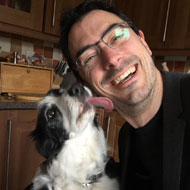Vet profession needs ‘cultural evolution’ - election candidate

Dr Stacey worked in first opinion practice for 10 years after graduating from the RVC in 2000.
Dr Huw Stacey, director of clinical services at the Pets at Home Vet Group, is standing for election to the RCVS Council for the first time. Writing in his candidate manifesto, he says he believes the veterinary profession needs a ‘cultural revolution’, encouraging learning not blame.
‘To have a bright future, we must develop a positive, emotionally intelligent and supportive mindset, striving for the highest clinical standards, while recognising human fallibility and viewing it as an opportunity for learning and improvement, not for blame and guilt,’ he explains.
Dr Stacey worked in first opinion practice for 10 years after graduating from the RVC in 2000, performing a mix of small animal, farm, equine and zoo work, in addition to a spell with MAFF during the 2001 foot-and-mouth outbreak. Following a short time in industry, he joined Companion Care in 2011.
He considers himself ‘a general practitioner at heart’ and a ‘passionate advocate of the veterinary profession’.
Having been a member of the Vet Futures Action Group last year, he says he is a ‘firm believer’ in the project’s vision and ambitions. Started by the RCVS and BVA it aims to help the profession prepare for and shape its future.
Dr Stacey is a clinical advisor to the Vet Client Mediation Service trial, which he believes is a ‘vital competent’ of maintaining the future credibility of the profession in the public eye. He is also a current member of the VN Futures Action Group, BVA Veterinary Policy Committee and the Veterinary Major Employers Group.
He believes there is ‘much more to do’ in improving the welfare of vets, in order to build a ‘resilient, healthy, happy workforce’, but says he is pleased this area is becoming increasingly well recognised.
Dr Stacey also feels the profession should embrace evidence-based medicine in deciding what is appropriate, and inappropriate, to offer. However ‘this ideal should always be caveated with the pragmatism necessary for the real world: when insufficient good quality evidence exists, clinical judgement and experience must prevail.’
Ballot papers will be posted to all veterinary surgeons and nurses that are eligible to vote in the week commencing 13 March. All votes must be cast by 5pm of 28 April 2017.



 The Animal and Plant Health Agency (APHA) has updated its online reporting service for dead wild birds.
The Animal and Plant Health Agency (APHA) has updated its online reporting service for dead wild birds.